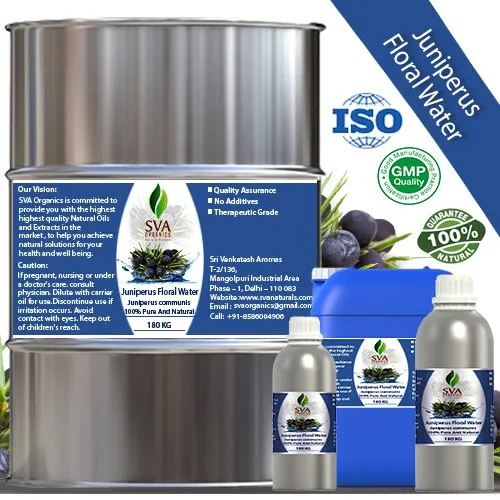Juniperus Floral Water
₹750.0 / Kg
| Form | Liquid |
| Packaging Size | 1 liter |
| Packaging Type | Bottle |
| Plant Part Used/Extracted From | Flower Petals |
| Brand | Sri Venkatesh Aromas |
| Extraction Method | Steam Distillation |
| Country of Origin | Made in India |
- Description
- Additional information
- Reviews (0)
- Q & A
- Sustainability Remark
- More Offers
- Store Policies
- Inquiries
Blends With:
- Lavender, lavandin, pine, clary sage, cypress, vetiver, sandalwood, rosemary, fir needle, basil, fennel.
Uses:
- Juniper berries are used to provide flavour to meat dishes, in treating infections, especially within urinary tract, bladder, kidneys & prostate
- Its antiseptic properties also help in removing waste & acidic toxins from body, thus stimulating fighting action against bacterial & yeast infections
Specifications:
| Botanical Name | Juniperus communis |
| Color & Odor | Colorless clear liquid with Characteristic juniper berry odor |
| Solubility | Soluble in Alcohols, Essential Oils and insoluble in water |
| Essential Oil Content | >0.025 % |
| Extraction Method | Hydro Distillation |
| brands | Sri Venkatesh Aromas |
|---|
You must be logged in to post a review.
Q & A
Essential floral waters are typically obtained as by-products during the steam distillation process of essential oils from plants. These waters are commonly used in aromatherapy, skincare, and cosmetic formulations due to their therapeutic and soothing properties.
The sustainability of essential floral water depends on several factors, including the plant species used, the cultivation methods, and the distillation process. Here are some points to consider:
Plant species: The sustainability of essential floral water depends on the plant species used. Some plant species are endangered, and the use of their floral water could contribute to their further decline. It is important to choose plant species that are abundant and not at risk of extinction.
Cultivation methods: The cultivation of plants for the production of essential oils and floral waters can have a significant impact on the environment. Sustainable cultivation practices such as organic farming, regenerative agriculture, and permaculture can help minimize the environmental impact.
Distillation process: The distillation process used to extract essential oils and floral waters can also affect their sustainability. Traditional methods such as water and steam distillation are generally more sustainable than methods that use solvents or chemicals.
Packaging: The packaging of essential floral water can also impact its sustainability. Using recyclable or biodegradable packaging materials can help reduce the environmental impact.
In summary, the sustainability of essential floral water depends on several factors, including the plant species used, the cultivation methods, the distillation process, and the packaging. By choosing sustainably produced floral waters and supporting environmentally responsible practices, we can help ensure their long-term availability and minimize their impact on the environment.
General Inquiries
There are no inquiries yet.

















Reviews
There are no reviews yet.